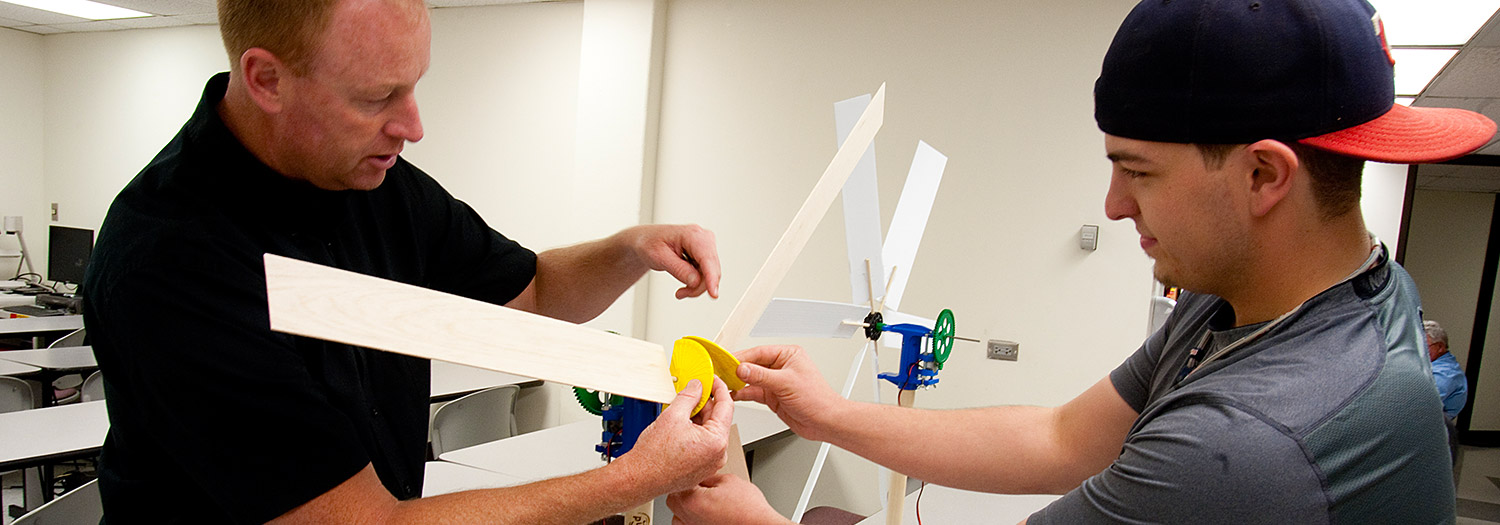Energy Careers, Science Option
Program Objectives
The energy industry is a major employer in Oklahoma and the source of many high paying jobs. With the right education and training, you can become a well-paid professional in the energy field that benefits millions of people every day. Rose State College provides the ideal place to begin your studies in preparation for an energy career.
Rose State College offers all the prerequisite courses you will need to transfer and pursue either of two career path options. The first option is the science degree track that transfers into the various science programs (engineering, environmental science, chemistry, physics, or geosciences) at the College of Engineering at the University of Oklahoma, Mewbourne College of Earth & Energy, or the College of Atmospheric and Geographic Sciences all located on the campus of the University of Oklahoma. These transfers are also applicable to Oklahoma State University’s College of Engineering Architecture and Technology, College of Agricultural Sciences and Natural Resources, or College of Arts and Science.
The second option is a business degree track that aligns you with the bachelor's degree in business and energy management at the University of Oklahoma’s Michael F. Price College of Business.
Click here for the Business degree track
Science Option
Students who are interested in careers such as being an engineer (petroleum, chemical, mechanical, electrical, or industrial), geologist, environmental scientist, or technologist would enroll in Rose State's core courses designed for the scientific side of the energy industry.
Which classes should be taken at Rose State in order to transfer successfully to a four-year university?
Besides the regular college prerequisite courses, a Rose State College student would be required to take some of the following STEM classes (depending on their science major):
| *Please check with an academic advisor for more information. | |
| Subject | Course(s) |
| Math | Calculus I, II, III, & IV, Differential Equations |
| Engineering | 2113, 2133, 2203, 2233, 2233, 2413 (Statics, Dynamics, Strength of Materials, Thermodynamics, Fluid Mechanics, Electrical Science, Digital Signals and Filtering, Rigid Body Mechanics and Material Design and Manufacturing Processes) |
| Chemistry | 1135 1145 Chemistry (I & II) |
| Physics | 2434 & 2444 (I & II) |
| Geosciences | 1114 Intro. to Physical Geology, 1123 History of Life on Earth, 1124 Historical Geology, 2002 Intro. to Geologic Mapping |
| Meteorology | 1014 Intro to Weather and Climate & 1123 Intro to Meteorology |
| Environmental Science | 1103 Introduction to Environmental Science |
FAQ
When are Rose State College's science, technology, engineering, and math (STEM) courses offered?
Daytime, evening, and online classes are offered.
What are the different STEM associate degrees a Rose State College student should pursue before transferring?
Associate in Science, Associate in Chemistry; Associate in Science, Engineering; Associate in Science, Geosciences, Associate in Science, or Environmental Science; would all be good options.
What is involved in transferring?
Once your associate degree is completed, established transfer agreements will allow the four-year university to accept all of your Rose State course credits. It is up to the graduate of Rose State College to know the universities deadlines for the semester they would like to attend. Submit official transcripts from Rose State and each prior collegiate institution attended, along with a high school transcript. Each applicant will be notified of their acceptance.
What are some of the companies I could work for with a bachelor's of science degree?
Oklahoma City and Tulsa are hubs for large energy companies such as SandRidge, ConocoPhillips, Devon, Chaparral, and Chesapeake Energy to name a few. Soon the new General Electric Global Research Center, dedicated to energy industry technologies, will be operating in the Oklahoma City area.
Other Oklahoma energy industry employers include: Apache, Chevron, BP, Marathon Oil, ExxonMobil, NGEAO, Lancer Resources, L.P., OCPL, OERB, Noble Energy, QEP Energy Company, Samson Resources, SM Energy, SWN Southwestern Energy, WPX Energy, Statoil, XTO Energy, and Zenergy.
Graduates are expected to find many opportunities in the areas of exploration.
What are the possible starting salaries?
Based upon educational degree and experience, salary packages range from $50,000 to $100,000. These packages may include signing bonuses, retention bonuses, relocation expenses, and reimbursement of tuition for the final year.




